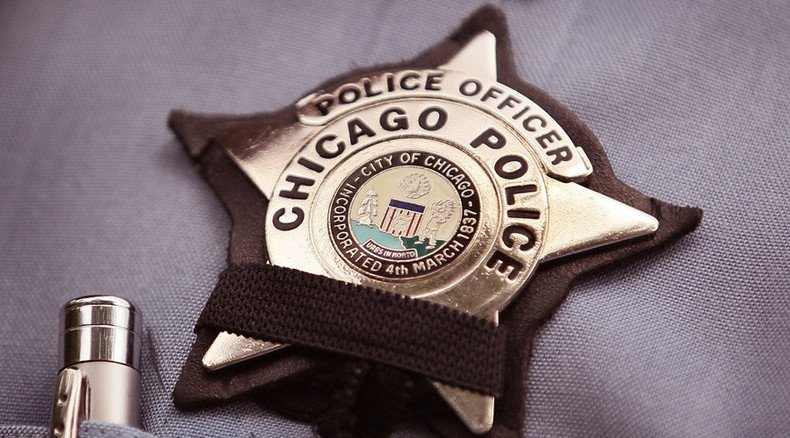Illinois passes sweeping police reform bill with rules on chokeholds and body cameras

The governor of Illinois signed a sweeping police reform law which establishes wide-ranging rules for body cameras, largely prohibits chokeholds, introduces bias-free policing, and demands more data collection on arrests.
The measure, dubbed the Police and Community Improvement Act, is a compilation of 200 separate pieces of legislation intended to reform policing practices. It passed by a wide margin in the House and Senate and was signed into law on Wednesday by Governor Bruce Rauner.
“Illinois has set the standard, set the standard nationally,” State Senator Kawame Raoul, a Chicago Democrat and co-sponsor of the bill, said a press conference, according to the AP.
The 174-page measure largely prohibits chokeholds except when deadly force is necessary. Deadly force is warranted under Illinois Criminal Code, 2012, article 7 when officers need to defend themselves or another person, or to protect property. The law also adds training guidelines to help officers become more aware of bias and achieve cultural competency.
The bill doesn’t mandate body cameras, but does specify how long they should be worn, when they must be turned on, and how long recorded videos should be kept. Under the law, body cameras must be turned on 30 seconds before an encounter with the public, be able to record for 10 hours, and be on at all times when an officer is responding to a call. An officer must inform the public they are being recorded.
Under the law, body camera footage will be held for 90 days before being destroyed unless it has been flagged because of a complaint or as part of an investigation.
The new measure provides an exemption to an Illinois law prohibiting eavesdropping.
As body cameras are expensive and many police department lack the funds to outfit their officers, a $5 increase in traffic fines will be dedicated to providing grants to pay for cameras and training.
Rauner signs police body camera bill into law - Chicago Tribune
Illinois #PoliceReformhttp://t.co/DrN3yjaMxd
— Jillian Hurley (@BeautyBind) August 13, 2015Police officers also have new guidelines for making pedestrian stops and arrests. An officer will be required to issue a receipt, which must contain the officer’s name and badge number, noting the reason for the stop.
The bill forbids police departments from investigating themselves in cases of officer-involved shootings. A report on the findings will be sent to the State’s Attorney of the county in which the police-involved death occurred. If the officer is not indicted, a record of the investigation will be made public.
The law also requires police departments to submit monthly and annual reports on crime statistics to the Department of State Police which, under the act, will serve as a central repository and custodian for this data. Those crime statistics will include details on arrest-related deaths, criminal homicides, police discharge of firearms, crime incidents, and offenses in schools.
READ MORE: Video surfaces of Chicago cop shooting into car full of black teenagers
“Police encounters gone tragically wrong in Ferguson, New York City, Baltimore and elsewhere forced the nation to confront uncomfortable realities about race and policing in America, and here in Illinois, lawmakers on both sides of the aisle felt compelled to take action to address the disparities and restore trust,” said Representative Elgie Sims (D-Chicago), who spearheaded the legislation in the House.
“Independent investigations, better training and better record-keeping will foster an atmosphere of seriousness about tackling racial disparities in law enforcement and zero tolerance of police misconduct.”
The Illinois measure enjoyed strong bipartisan support that stemmed from an unusual alliance comprised of police unions, the American Civil Liberties Union, and the NAACP.
The law comes into full effect in January 2016. In the meantime, the state will immediately form a commission to review training requirements and other issues. This commission should report to legislators and the governor by the end of January.
READ MORE: Chicago PD detained 3,500 people at 'secret' interrogation site, 82% black – report
Illinois joins Colorado and Connecticut as the latest state to introduce sweeping police reform measures after nationwide outcry over the police shooting death of black teenager Michael Brown in Ferguson, Missouri, and the chokehold death of Eric Garner, a black man from Staten Island, New York. Neither of the white police officers involved in the killings were indicted for the deaths in those cases.
The new reforms come just a week after The Guardian obtained documents showing that the Chicago Police Department is operating a CIA-type black site at Homan Square, where 3,500 people have been detained and denied their civil rights. According to the article, inmates were often shackled for hours, refused their right to a phone call to family or relatives, and denied access to lawyers. They were not even initially listed as detained in central booking.












